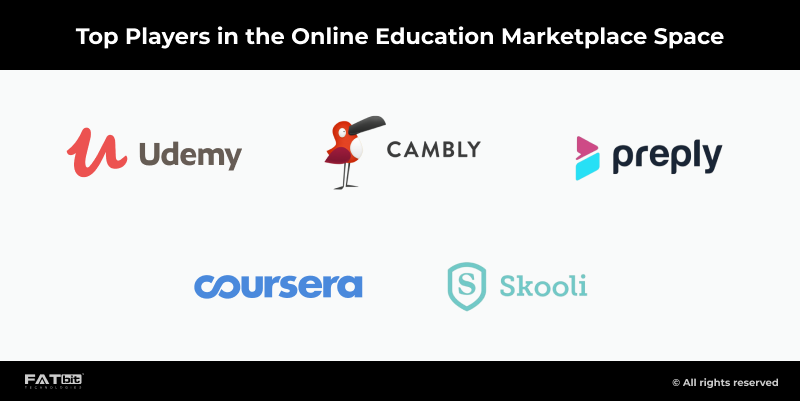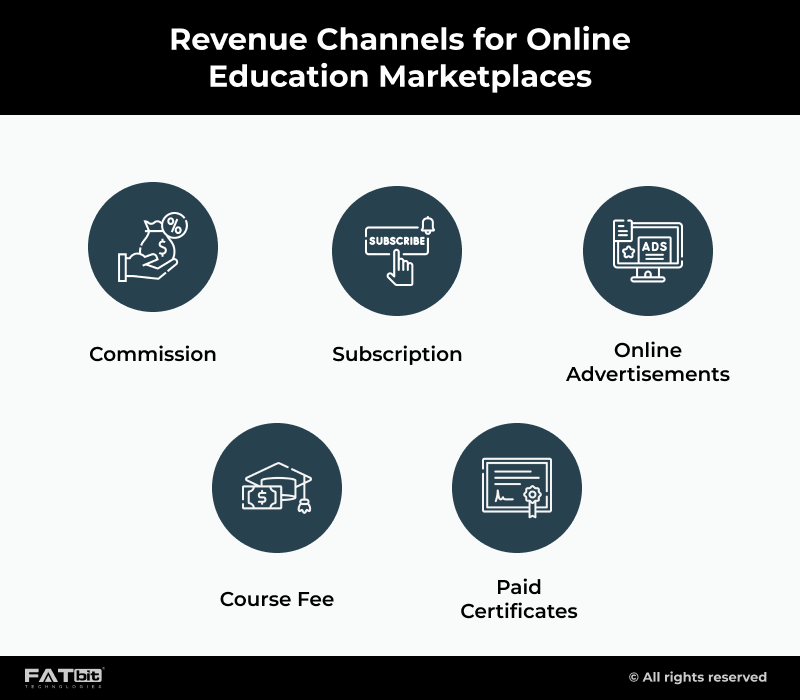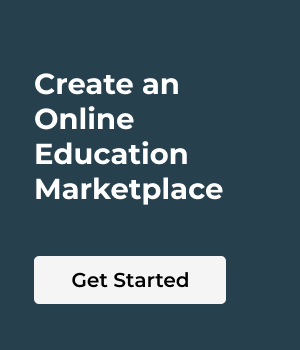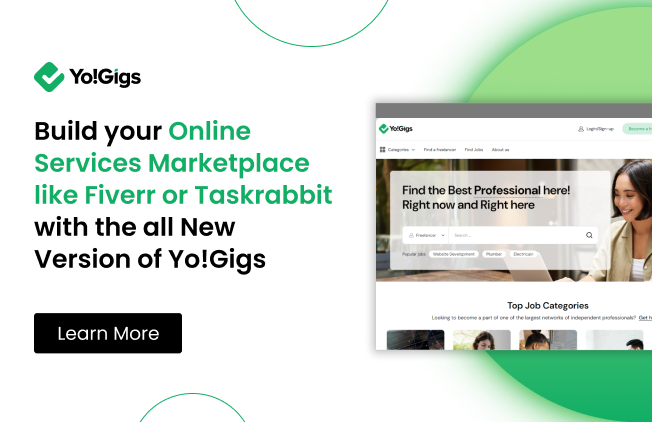In today’s world of digital advancements, online education marketplaces are gaining traction. They help in breaking down geographical barriers and in connecting education providers with students from all over the world.
According to Statista, the online education market is estimated to reach USD 185.20 billion in 2024. Further, it is expected to experience an annual growth rate of 8.61% from 2024 to 2028, resulting in projected market growth of USD 257.70 billion by 2028, demonstrating the vast potential and profitability of this sector.
That being said, this post entails the roadmap to navigate the intricacies of creating an online education marketplace, regardless of whether you are an experienced entrepreneur or are just planning to begin your entrepreneurial journey.
Table of contents
What is an Online Education Marketplace?
An online education marketplace is a platform that brings together teachers, learners/peers, and real-world experts to provide a holistic learning experience to learners. It is a complete digital education ecosystem that supports learners with different personalities and needs.
Education Marketplace Niches and Types
To keep pace with the shifting dynamics of learning and for better education delivery, many types of education marketplaces have come into existence. Mentioned below are some of them.
Online Tutoring Marketplace Platforms
Online tutoring platforms help education to evolve a step in the right direction by creating a collaborative environment between learners and tutors, facilitating personalized learning experiences beyond the classroom.
Examples: First Tutors, GoStudent
Online Course Marketplaces
Online course marketplaces provide various pre-recorded online courses on different subjects to individuals who are interested to acquire new knowledge, skills, and pursue professional or personal goals.
Examples: Coursera, Thinkfic
Language Learning Marketplace Platforms
These platforms are redefining the language learning process by offering immersive language learning experiences to learners. Furthermore, they offer authentic pronunciation, idiomatic expressions that traditional setup of textbook and classroom learning fail to convey.
Examples: Preply, italki
K-12 Education Marketplaces
Online K-12 education marketplaces are hubs that connect students, parents and teachers with a range of K-12 educational resources together in one-place. Moreover, teachers and parents can collaborate using these platforms to share insights in order to enhance learning outcomes.
Examples: Teachers Pay Teachers, K12
Higher Education Websites
According to an article (Harvard Business Review), “universities are the gatekeepers of knowledge and stewards of human capital.” Hence, by harnessing the power of digital technologies, higher education websites are empowering students at a global level by making university curricula more accessible to them.
Example: FutureLearn
Online Career Coaching Marketplace Platforms
For a world that is being overturned by technology, people are forced to reexamine their career trajectory. It is getting increasingly difficult to chart a career path on the basis of existing skills and knowledge. Hence, online career coaching platforms play a crucial role in allowing individuals to cultivate career agility.
Examples: Koachee, Stay Nimble
Online Mentoring Marketplace Platforms
Now more than ever, individuals need a supportive mentor who can assist them in finding their strengths and a learning-forward mindset. This is where online mentoring platforms play a pivotal role.
Examples: Clarity.fm, GrowthMentor
Corporate Training Marketplaces
In response to disruption brought about by technological advancements, many corporate leaders and entrepreneurs are investing in their workforce by providing them corporate training through courses or resources available on corporate training marketplaces.
Example: Udemy
Help Individuals Access Education Worldwide by Launching An Online Education Marketplace
Popular Players in the Education Marketplace Space
The shift of learners to online education marketplaces is enthralling, with a few dominant players who are disrupting the space by offering flexible learning opportunities. Mentioned below, are a few of the famous education marketplace players.

Udemy
A top online education marketplace that allows instructors to create and upload courses on their preferred topics and earn. Instructors can also interact with users via online discussion boards.
Coursera
Coursera is another online education marketplace that was founded by Daphne Koller and Andrew Ng in 2012. The platform offers online courses and degrees from leading universities and companies.
Preply
Preply is a leading language learning platform that was founded in the United States by Serge Lukyanov, Dmytro Voloshyn, Kirill Bigai in 2012. The official website was made available in 2013. Currently, Preply has over 32,000 tutors who offer classes in 50 languages.
Cambly
Cambly is a California based education app that started its journey in 2012 as a simple iPad app. It is co-founded by Kevin and Sameer. The students can now either use its platform or app to connect with native English speakers to improve their speaking and listening skills.
Skooli
Founded in August 2014 by Dave Frey and Rene Frey, Skooli is an online education platform that connects tutors with K-12 and college students. It provides one-on-one tutoring sessions that allows students to get personalized assistance for difficult to understand topics.
Now that we have learned about the major players, let us discuss the features that give education marketplaces a distinct advantage over traditional educational delivery.
Features Giving Online Education Marketplaces an Edge Over Traditional Delivery
Education marketplaces are democratizing education. In addition, they focus on providing personalized learning experiences that enhance the effectiveness of education delivery, making it more student centric. Discussed below are a few features of education marketplaces.
Simple Registration: This feature allows user friendly registration to tutors and students.
Search and Filter: This feature allows students to search for courses/tutors according to their preferences.
Course Listings: Using this feature, tutors can easily list courses with proper tags, detailed description including syllabus, duration and more.
Interactive Learning Tools: Includes video chat, live chat, virtual interaction in real-time and more. Using these tools, students and tutors can interact with each other seamlessly.
Multiple Payment Gateways: This feature enhances the success of an education marketplace as it allows students to make payments via payment gateways of their choice.
Multilingual/Multicurrency: These are pivotal features as they let the platform operate in geographically different regions. Being multilingual allows the platform to support content in multiple languages, whereas multicurrency allows transactions in multiple currencies.
Reviews and Ratings: This feature allows students to view and give ratings and reviews to courses of tutors.
Progress Tracking: Using this feature, the students keep track of their progress.
Analytics and Reports: This feature presents data in a structured format so that the admin can analyze and identify trends for better decision making.
Launch a Feature-Rich Online Education Marketplace
Popular Monetization Strategies for Online Education Marketplaces
As mentioned, online education marketplaces are reshaping the educational landscape in the digital age. But for them to sustain and scale, having monetization strategies in place are critical and diversifying them can be a game changer. Mentioned below are popular monetization strategies.

Commission
The admin of the education marketplace can make money by predefining the commission on every session or course.
Online Advertisements
This strategy can be used to display ads on the education marketplace as a way to earn money.
Course Fee
This strategy allows the admin to charge learners a fee to enroll in individual courses.
Subscription
This strategy allows learners to access premium content such as courses and other study material for as long as the subscription is active.
Paid Certificates
This strategy allows learners to get a certificate after course completion, which they can add to their resumes. While the course could be free of cost, to get a verified certificate, a fee would be levied.
Drive Profitability by Launching an Online Education Marketplace
Starting an Online Education Marketplace
In a post-pandemic world, online education has become the new normal. Teachers and students across the globe are opting for online methods. Hence, to meet the rising demand, building an online education marketplace that has its own unique value proposition requires careful planning. Here are the steps:
- Market and Competitor Research
- Define your Value Proposition
- Choose the Platform Type
- Development of the Marketplace
- Testing and Deployment
- Launch and Maintenance
Market and Competitor Research
This is the first and the most important step, where you need to deep dive to understand the market anatomy. Here, it is also important to note that conducting competitor analysis is also pivotal. This is because it will help you in identifying any gaps in the market, the strengths and weaknesses of players and their marketing strategies.
Define your Value Proposition
After understanding the pain points and gaps in the market, it is time for you to define your value proposition, i.e., determine what will set your education marketplace apart from the competition.
Choose the Platform Niche
To attract a more engaged audience, in this step, you need to choose the type/niche for your online education marketplace. It can be a tutoring marketplace, language learning marketplace, K-12 marketplace, career coaching marketplace, and so on.
Development of Education Marketplace
In order to build an effective online education marketplace, in this step, the developers collaborate to turn your vision into reality. There are several stages that include UX/UI designing, frontend development, backend development, and so on. It is important to note that on the basis of the features described above, the development time can vary.
Testing and Deployment
Once the development is complete, the next step involves rigorous testing. This is a crucial step as here it checks whether the developed marketplace meets the intended requirements. The process also involves various types of testing such as user acceptance testing (UAT), functional testing, performance testing, and so on. If any bugs are found then the developers fix them until the marketplace is free from them. Then the marketplace is deployed to a production environment and is again monitored for any performance or security issues.
Launch the Online Education Marketplace
Post deployment, the marketplace is made live for users. On the basis of user feedback, technological advancements and evolving industry trends, you can keep your marketplace updated.
That said, building a custom education marketplace entails following key considerations:
- High Development Time
- High Development Cost
- Technical Knowledge Know-How
On the other hand, you can choose a readymade solution and launch your education marketplace hassle-free. Here are a few key benefits of opting for an off-the-shelf education marketplace solution:
- Faster Time to Market
- Lower Cost
- Industry-oriented Features
- Tested and Trusted by Global Clientele
- Technical Support and Regular Updates
- Documentation is Provided
- Free Walkthrough of the Solution
- Module Specific Tutorials
How Can Yo!Coach Help in Launching an Online Education Marketplace?
Yo!Coach is a globally trusted readymade education marketplace solution that is meticulously designed to cater to the needs of tutors, learners and administrators. It comes with a user-friendly interface and encapsulates a rich suite of features. It is fully customizable and scalable. Additionally, mobile apps for learners are also available for both Android and iOS users. Using Yo!Coach entrepreneurs can quickly launch their education marketplace with ease and they do not need to have technical expertise. Moreover, 12 months of free technical support is also provided.
Key Highlights of Yo!Coach
- GDPR Compliant
- Multilingual
- Multicurrency
- Customizable & Scalable
- Supports Multiple Payment Gateways
- 12 months Free Technical Support
- Mobile Apps for Learners (Android & iOS)
See why Yo!Coach is A Robust Solution to Launch an Online Education Marketplace
Conclusion
Needless to say, online education has gone mainstream. Both students and teachers are now enjoying opportunities that weren’t previously available. Emerging technologies have transformed the education landscape, where online education marketplaces have taken education beyond the traditional classroom setting. Hence, if you are looking to create an online education marketplace, the time is ripe. For more information on how to get started, you can get in touch with us.




